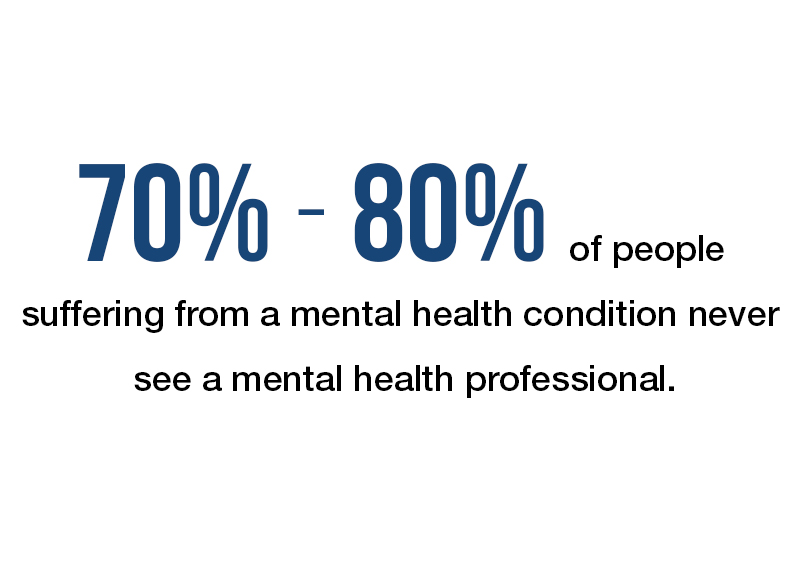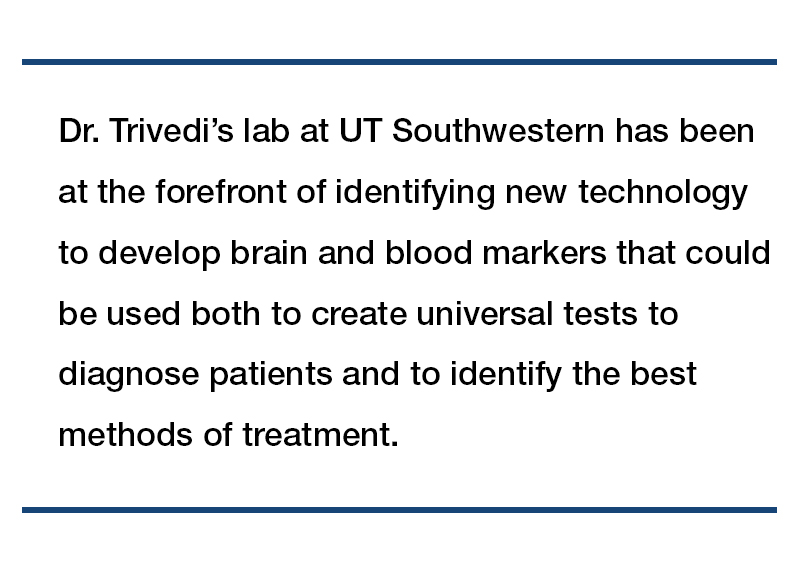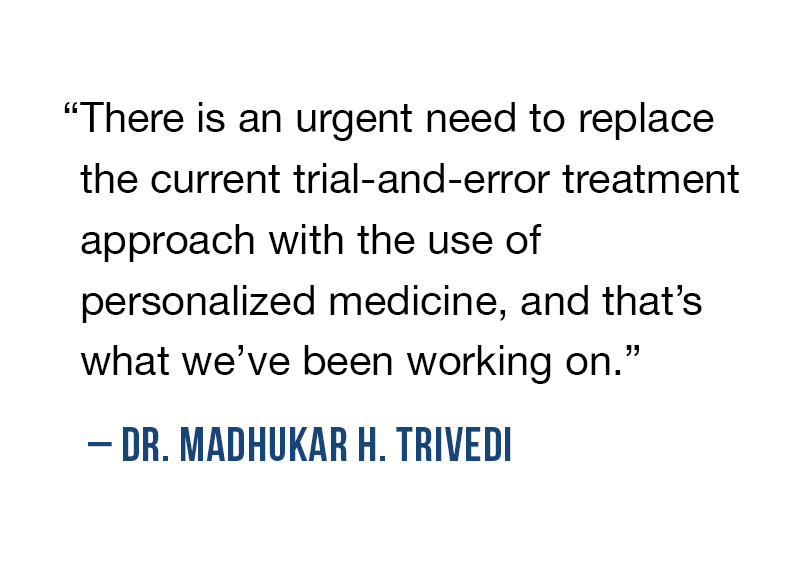The depression test: A new Texas two-step

One in five Texas adults will experience a mental health concern at some point this year, and more than 20% of children in Texas ages 9-17 have a diagnosed mental illness, according to the National Alliance on Mental Illness. Across the country, the numbers are equally concerning: major depression and its most extreme consequence, suicide, is rising in all age groups.
But according to researchers at UT Southwestern Medical Center, the situation is not hopeless. As with cancer and other diseases, most mental illness caught in an early phase and with the right treatment applied can be managed, which is why mood disorder specialists at the UTSW Center for Depression Research and Clinical Care have devised a simple yet innovative screening and assessment tool for physicians and continue to develop campaigns to reach individuals who need help before they have a crisis.
As the director of that center — a cornerstone of the Peter O’Donnell Jr. Brain Institute at UT Southwestern — Dr. Madhukar H. Trivedi is on a mission to transform the way depression is diagnosed and treated, to accelerate scientific discovery and to disseminate the new findings to real clinical practice.
One hurdle Dr. Trivedi and his team face is that, despite somewhat more public enlightenment on the subject, instances of depression today still go undetected and untreated on a colossal scale.

It’s difficult to imagine that statistic in the context of any other illness. Imagine if 70% of people suffering from life-threatening cancers never saw doctors. Imagine if 80% of people with chronic lung conditions never sought treatment and instead slowly deteriorated in silence.
“There’s a lot of fear, a lot of uncertainty, a lot of confusion, a lot of ignorance and therefore stigma,” Dr. Trivedi says. For that, he blames prevailing social attitudes toward mental illness and insufficient mental health training and cutting-edge research within the medical community.
But he also has a solution.
Reversing the trends
There are two questions you can ask someone that indicate he or she might be depressed: 1) Do you feel sad? and 2) Have you lost interest in doing things that used to give you pleasure? That’s what Dr. Trivedi’s VitalSign6 tool asks patients in an attempt to identify two main anchor symptoms of depression.
“Those two things are more than enough,” Dr. Trivedi says. “For those who screen positive, there is a diagnostic checklist you have to go through.” Generally, about 15% of people screen positive and about 12% have clinical depression.
“Unfortunately,” he adds, “for the longest time, people have addressed depression only when there is a crisis or when there is a significant dysfunction, like when they lose their jobs or they get divorced.”
But if those two questions were asked as part of routine medical care, Dr. Trivedi says, doctors would have an effective way to screen every patient who walks through their doors for potential mental health issues — meaning diagnosis would be a basic part of general health care. The stigma surrounding these issues would dissolve, and more people would get help before — not after — they need it.
“When you take your 15-year-old son for a physical exam, the pediatrician goes through a standard procedure — checks his weight, measures his height, takes his blood pressure and so on. But typically, he will not be asked about his mood or whether he ever wants to hurt himself,” Dr. Trivedi says. “As a psychiatrist, I can’t help but question this practice. Teens are more likely to be depressed than to have hypertension. Unfortunately, our society tends to ignore the mental health of teenagers until there’s an overdose or other tragedy. The time has come for doctors to reach out to teens who need help before they have a crisis.”
Dr. Trivedi knows that many primary care doctors are reluctant to assess a patient’s mental state because they feel they haven’t had adequate training to treat depression or other mental conditions. He also realizes many parents fear that probing their children’s feelings will only make them feel worse — a fear that, he notes, is misguided.
“Scientific evidence has shown that you can’t bring on depression just by asking someone about it,” he says. “And not asking teens if they are suicidal is no way to reduce suicides. To reverse the current trends in depression, we must educate parents about how to openly discuss the topic and provide pediatricians and primary care doctors with the training and tools they need to diagnose and treat mental illness.”
Toward that end, Dr. Trivedi and his colleagues at UT Southwestern have developed a diagnostic tool and treatment algorithm that can help doctors accurately diagnose patients with mental illness and help them get appropriate treatments.
The sense of VitalSign6
When he began his project, Dr. Trivedi knew he needed to create a tool that primary care doctors and pediatricians could use in their day-to-day practices.
“The challenge was how to do it without two hours with every patient because the doctors can’t afford it,” Dr. Trivedi says. “And once you diagnose, how do you treat, and what do you do for crisis; and if a patient is suicidal, what do you do? Therefore, it became very clear that we have to help them with some way of figuring out how to do it.”
The first response his team developed was a computer-based platform that could accurately pinpoint through a series of simple questions whether patients required further mental health care; to be a solution and fit into the basic workflow of the doctor’s office, the tool had to be as simple and easy to adopt as possible.
That’s how VitalSign6 — a web-based application that screens patients with the Patient Health Questionnaire 2 (PHQ-2) — was born. If a patient answers no to the two PHQ-2 questions, there is a 98% likelihood that he or she is not at risk for depression, and no further steps are necessary. If a patient screens positive, the application automatically leads him or her through a series of follow-up health care assessments, leading to a more accurate and effective diagnosis.
Dr. Trivedi notes that getting more patients diagnosed will work only if there’s a standardized process for treating depression. Thus, VitalSign6 doesn’t just systematically screen for depression; it also gives providers assessment tools that measure critical associated symptoms and offers clinical decision support as part of its measurement-based treatment model.
“With VitalSign6, by the time the doctor comes to the exam room, the basic diagnostic questions have already been answered, so their time with the patient about exploring all of this is minuscule,” Dr. Trivedi says. “The doctor then opens the chart up, talks to the patient, and confirms the diagnosis or makes the treatment decision — guided by a scientifically based algorithm — and then that’s the end of it.”
The result, for Dr. Trivedi, is that everyone has the opportunity to have mental health issues recognized and the resources to get the right treatment.
Toward a better future
As technology and the culture around mental health treatment begin to catch up, Dr. Trivedi’s lab has been able to test new ways of analyzing and diagnosing the causes and symptoms of depression.

These brain and blood markers are further proof of the research Dr. Trivedi has been compiling over his career: that depression can and should be treated as a medical illness.
Our ultimate goal is to eliminate the devastating effects of depression on millions of lives, and to get there we need to improve early recognition by identifying brain, blood and behavior-based diagnostic tests.”
Helping to achieve that early-recognition goal is one of the main ideas behind VitalSign6. Dr. Trivedi has incorporated the app into his lab’s two latest depression studies, which will identify 2,500 people with depression or bipolar disorder and 2,500 people at risk of developing depression, with the aim of fine-tuning tests for diagnosis and identifying effective treatments.
In addition, his team is partnering with schools and clinics around Dallas to identify potential study participants using VitalSign6 in hopes that incorporating the tool into a clinical setting will begin to shift the culture around mental health screening in the field and open doors for the computer application to be used in general practice.
There is still a lot fear, uncertainty, confusion, ignorance and stigma surrounding mental health, Dr. Trivedi notes. Depression still primarily enters the popular conversation not because of awareness marches or fundraising drives but through the tragedies that the disease too often inflicts on people whose battles go unchecked.
Dr. Trivedi hopes his test will help change that. He sees a future when doctors in Texas and elsewhere will be able to screen for depression like they might heart disease through universal brain and blood tests, a future when it will not be suicides that bring the disease into the spotlight, but a better awareness of mental health issues that allows them to be treated, not ignored.

